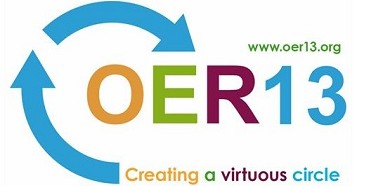Gema’s slides from her presentation
@gema_bueno presented on how librarians and libraries are involved in the OER Communities.
I’m not a librarian, so I tweeted to ask if any library has an OER policy. Obviously Nottingham has Open Nottingham, and Leeds has an OER policy, but I am not explicitly aware of a library with a commitment to OER as a policy (perhaps Open Michigan).
How well the classical librarian skill set suits OERs and OER promotion – and also assessing the quality of OERs. This could be seen as similar to books, but I assume lecturers do much of the book vetting and quality assurance.
Are librarians also the people to be promoting licenses and discussing copyright issues directly? Classically OER production might not involve librarians, and then librarians may be outside the OER loop.
Gemma suggested a structure for librarians to get involved – the slogan being “from containers to content to context” – suggesting librarians cataloging both their own institution and the world’s OERs – but would steps such as this need institutional, professional or national bodies to co-ordinate this work?
